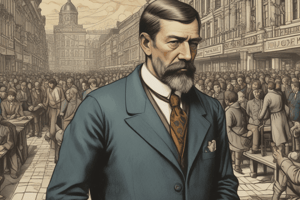Podcast
Questions and Answers
What was Max Weber's nationality?
What was Max Weber's nationality?
- German (correct)
- Italian
- French
- British
What was Max Weber's father's occupation?
What was Max Weber's father's occupation?
- A politician (correct)
- A professor
- A businessman
- A lawyer
What did Max Weber's mother experience after the deaths of two of their children?
What did Max Weber's mother experience after the deaths of two of their children?
- A sense of relief
- A feeling of anger
- A prolonged grief (correct)
- A period of great joy
What did Max Weber study at universities in Heidelberg and Berlin?
What did Max Weber study at universities in Heidelberg and Berlin?
Who did Max Weber marry in 1893?
Who did Max Weber marry in 1893?
What did Max Weber believe was necessary to stave off self-indulgence and laziness?
What did Max Weber believe was necessary to stave off self-indulgence and laziness?
What is the title of Weber's most famous work?
What is the title of Weber's most famous work?
What is the primary reason for capitalism developing in Europe, according to Weber?
What is the primary reason for capitalism developing in Europe, according to Weber?
What is the term for the efficient and predictable form of organization, according to Weber?
What is the term for the efficient and predictable form of organization, according to Weber?
What are the three components of social stratification, according to Weber?
What are the three components of social stratification, according to Weber?
What is the methodological tool developed by Weber for comparative sociology?
What is the methodological tool developed by Weber for comparative sociology?
What is the impact of Weber's work on social science and sociology?
What is the impact of Weber's work on social science and sociology?
Flashcards are hidden until you start studying
Study Notes
Max Weber
Max Weber (1864-1920) was a German sociologist and political economist, renowned for his contributions to the fields of sociology, economics, law, religion, and business. Born in Erfurt, Prussia (present-day Germany), Weber's life and works have significantly shaped the way we understand and analyze society, capitalism, and bureaucracy.
Early Life and Family
Weber was born into a notable family. His father, an aspiring liberal politician, moved the family from Erfurt to Berlin and became a member of the Prussian House of Deputies and later the Reichstag. Weber's mother, raised in Calvinist orthodoxy, experienced a prolonged grief following the deaths of two of their children. This, along with his father's authoritarian manner and demand for absolute obedience, contributed to the inner agonies that haunted Weber in his adult life.
Education and Career
Weber studied law at universities in Heidelberg and Berlin, eventually writing works on Roman law and agrarian history. After completing his studies, he returned to Berlin and worked as a lawyer's assistant while continuing his research. In 1893, he married Marianne Schnitger, a second cousin who later became his biographer and the editor of his collected works. After his marriage, Weber began a compulsive work regimen that he believed was necessary to stave off self-indulgence and laziness.
The Protestant Ethic and Capitalism
One of Weber's most famous works is "The Protestant Ethic and the Spirit of Capitalism" (1904-05), which argues that the culture of Protestantism was a primary reason why capitalism developed in Europe before other parts of the world. However, Weber also noted that the values of capitalism itself had overtaken its Protestant roots.
Bureaucracy
Weber is also well-known for his ideas on bureaucracy, noting that it is an efficient and predictable form of organization that can be applied to any area of society. He believed that Protestantism, with its emphasis on hard work, frugality, and individual responsibility, paved the way for the development of bureaucracy and the rise of modern capitalism.
Social Stratification
Weber also developed a theory of social stratification, defining social differences through three components: class, status, and power. He believed that societal conflicts arise from the interplay of these three dimensions, making societal conflicts more complex than just a product of economic class struggle.
Later Works
After resuming scholarly work in 1903, Weber produced his most important work in the years following his partial recovery. He demonstrated that the comparative method was essential for understanding the behavior of institutions in societies and developed the ideal type as a methodological tool for comparative sociology.
Legacy
Weber's work has had a significant impact on the development of sociology and social science as a whole. His ideas on bureaucracy and rationalization continue to influence scholars and policymakers today.
In conclusion, Max Weber's contributions to sociology, economics, law, religion, and business have had a lasting impact on our understanding of society. His ideas on the Protestant ethic, capitalism, bureaucracy, and social stratification continue to be relevant and influential in the study of social and economic systems.
Studying That Suits You
Use AI to generate personalized quizzes and flashcards to suit your learning preferences.




